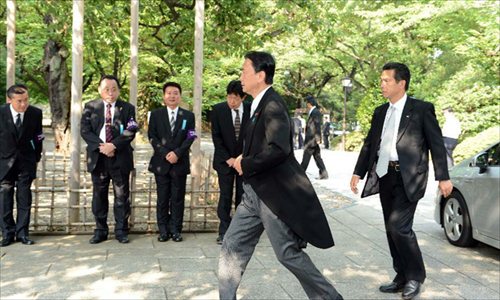HOME >> CHINA
China strongly condemns Japan over shrine visit
Source:Xinhua Published: 2013-8-15 15:15:58

Keiji Furuya (2nd, R), chairman of Japan's national public safety commission, arrives at the war-linked controversial Yasukuni Shrine for worship, in Tokyo, on Aug. 15, 2013. Visits to the shrine by Japanese ministers and lawmakers have sparked strong opposition from China and South Korea, both of which had suffered from Japan's aggression. Photo: Xinhua
China has strongly protested against and condemned the visits of Japanese cabinet members to the controversial Yasukuni Shrine on Thursday.
Vice Foreign Minister Liu Zhenmin summoned Japanese ambassador to China Masato Kitera and lodged representations over the issue, Chinese Foreign Ministry spokesman Hong Lei said.
It is an open challenge to historical justice and human conscience that Japanese cabinet members visited the shrine which honors Class-A war criminals on the 68th anniversary of Japan's surrender in World War II, Hong said. He added that it severely hurts the feelings of people in victim countries in Asia, including China.
The Yasukuni Shrine issue reflects whether Japan can correctly understand its own militarism and history of aggression, as well as respect the feelings of people in victim countries in Asia, Hong said.
"The attitude of those in power in Japan toward historical issues, including the shrine issue, concerns the political foundation of China-Japan relations," Hong said.
In whatever forms and names the Japanese leaders visit the shrine, the nature is that they attempt to deny and glorify the militarism and history of aggression and challenge the results of World War II and the post-war international order. This will draw firm opposition and unanimous condemnation from China and other Asian countries, he said.
Hong reaffirmed that Japan can only face the future by looking in the mirror of history. He urged Japan to deliver their commitment to deeply reflect upon their history of aggression and make real efforts to gain trust from the international community.
"Otherwise, Japan's relations with its neighboring Asian countries will have no future," the spokesman said.
Repeated visits to the shrine by Japanese leaders and lawmakers have become a major obstacle for Japan to mend ties with its neighbors, especially China and South Korea, which suffered from Japan's invasion during World War II.
Posted in: Diplomacy